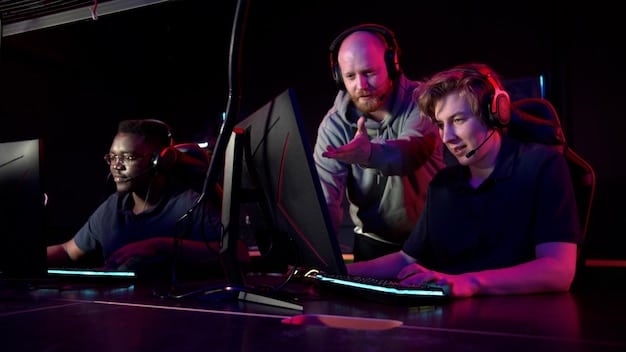Esports Coaching Salaries in US in 2025: Earning Potential

The earning potential for Esports coaching salaries in the US: What’s the earning potential in 2025? varies significantly based on experience, game title, team tier, and organizational backing, ranging from entry-level stipends to six-figure salaries for elite positions.
The landscape of professional esports has exploded, transforming from a niche hobby into a global industry with massive viewership and substantial investments. This growth has naturally led to the professionalization of supporting roles, and none is perhaps more critical than that of the coach. Aspiring and current coaches are increasingly asking: Esports coaching salaries in the US: What’s the earning potential in 2025? This article delves into the intricate factors shaping these salaries, providing a comprehensive outlook for the coming year.
The Evolving Role of an Esports Coach
The role of an esports coach extends far beyond simply understanding game mechanics. It encompasses a multifaceted skill set, akin to traditional sports coaching but with unique digital complexities. A modern esports coach is a strategist, a mentor, a data analyst, and often, a psychologist.
Unlike conventional sports where physical prowess is paramount, esports demands intense cognitive ability, rapid decision-making, and seamless team coordination. Coaches are instrumental in cultivating these attributes. They analyze opponent strategies, review VODs (video on demand) of their team’s matches, identify individual player weaknesses, and develop counter-strategies. The sheer volume of data involved in modern esports, from in-game statistics to player performance metrics, requires coaches to possess strong analytical skills to translate raw numbers into actionable insights.
Core Responsibilities Shaping Salary Expectations
Understanding the coach’s daily responsibilities is key to appreciating their potential compensation. These duties are not static; they evolve with game meta shifts, player dynamics, and organizational goals.
- Strategic Development: Crafting game plans, drafting strategies, and adapting to opponent’s playstyles. This often involves deep dives into game patches and community-driven meta changes.
- Player Development: Individualized training, skill improvement, and fostering a positive team environment. This includes handling player emotions, managing conflict, and maintaining motivation.
- Performance Analysis: Utilizing advanced software to dissect gameplay, identify patterns, and pinpoint areas for improvement. This is a highly specialized skill requiring both gaming knowledge and data literacy.
- Team Chemistry: Building cohesion and communication amongst players, mediating disputes, and ensuring a healthy team dynamic crucial for long-term success.
Coaches also bear the weight of results. A team’s performance directly reflects on the coaching staff. High-stakes tournaments and league play can bring immense pressure, but also significant rewards for successful coaches. The ability to consistently deliver results under pressure is a significant determinant in salary progression.
Moreover, the growth of collegiate esports and amateur leagues has opened up new avenues for coaching, though often with lower initial compensation. These roles can serve as stepping stones, allowing coaches to hone their craft and build a portfolio of experience before moving into higher-tier professional environments.
The prestige and financial backing of the organization are also critical factors. Top-tier organizations with robust infrastructure and significant sponsorship deals can offer more competitive salaries and benefits, reflecting the increased demands and expectations placed on their coaching staff.
Factors Influencing Esports Coaching Salaries in 2025
Several variables contribute to the broad spectrum of esports coaching salaries. These factors are interconnected, creating a complex salary landscape that is constantly shifting with the industry’s rapid evolution. Predicting an exact figure for an “average” salary becomes challenging without considering these nuances.
Game Title and Popularity
The specific game being coached plays a monumental role in salary determination. Games with larger player bases, higher viewership, and more robust competitive circuits generally offer better compensation for coaches. Titles like League of Legends, Dota 2, Counter-Strike 2, and Valorant boast massive international fanbases and multi-million dollar prize pools, allowing organizations to invest more heavily in coaching staff.
Conversely, coaching a less popular or emerging title might offer lower pay, though it can provide opportunities for coaches to establish themselves within a nascent competitive scene. The game’s longevity and stability also factor in; a game with a proven competitive history often offers more secure and lucrative coaching prospects.
Experience and Track Record
As in any professional field, experience is a prime driver of earnings. A coach with a proven track record of success, having led teams to victories in major tournaments or consistently high league finishes, commands significantly higher salaries. This includes not just wins, but also the ability to nurture talent, implement effective strategies, and manage team dynamics under pressure.
Entry-level coaches, perhaps starting as assistant coaches or in amateur leagues, will likely earn modest stipends or even work on a volunteer basis initially. Their compensation increases as they gain experience, develop a network within the industry, and demonstrate their value through tangible results. Seniority, combined with a strong resume of accomplishments, unlocks the top-tier salary ranges.
Team Tier, Organization, and Funding
The caliber of the team and the financial backing of the organization are paramount. Tier 1 esports organizations, often backed by venture capital, major corporate sponsors, or even traditional sports franchises, have significantly larger budgets for player salaries, operational costs, and, crucially, coaching staff. These organizations compete at the highest level, demanding world-class coaching talent.
Tier 2 and Tier 3 teams, while still professional, typically operate on smaller budgets, which directly impacts coaching salaries. Collegiate esports programs, while growing, also offer varying levels of compensation depending on the institution’s funding and commitment to esports.
- Tier 1 Organizations: Often offer six-figure salaries, comprehensive benefits, and performance bonuses. Their coaches are highly sought after and often have extensive experience.
- Tier 2 Organizations: Salaries typically range from mid-five figures to low six-figures, possibly with fewer benefits or smaller bonuses. These coaches are often highly skilled and aiming for Tier 1 ascent.
- Collegiate/Amateur Teams: Compensation can range from part-time hourly rates or stipends to modest full-time salaries, depending on the program’s funding and scope.

The stability and reputation of the organization also play a role. Coaches prefer to work for stable organizations that offer long-term contracts and a supportive environment, even if the starting salary might be slightly lower than a less reputable but higher-paying team.
Location and Cost of Living
While esports coaching is often a remote-friendly profession, especially for analytical roles, many top-tier teams operate out of dedicated facilities or team houses. If a coach is required to relocate, the cost of living in the region will naturally influence salary negotiations. Major esports hubs like Los Angeles, Dallas, or New York might offer higher nominal salaries to compensate for higher living expenses.
However, the global nature of esports means that some organizations might be located in regions with lower operating costs, potentially allowing them to offer competitive salaries without the same overhead as those in major metropolitan areas. This geographic flexibility can sometimes work in a coach’s favor, opening up opportunities in different markets.
Projected Salary Ranges for Esports Coaches in the US (2025)
Based on current industry trends, the continued growth of viewership and investment, and the increasing professionalization of the role, we can project a range of potential earnings for esports coaches in the US in 2025.
It is important to note that these figures are estimates and can fluctuate based on the specific factors outlined above. The market for esports talent is dynamic, and individual negotiations often play a significant role.
Entry-Level and Assistant Coaches
For individuals just starting their coaching career, perhaps transitioning from competitive play or gaining initial experience in collegiate or semi-professional circuits, the salary outlook is more modest. These roles are foundational, providing crucial experience and networking opportunities.
- Range: $25,000 – $50,000 annually.
- Details: Often salaried positions, sometimes including basic benefits. May involve stipends for part-time roles or performance-based incentives for new teams. Opportunities abound in collegiate esports programs or nascent professional leagues.
Assistant coaches typically support the head coach, focusing on specific aspects of the game or individual player development. This hands-on experience is invaluable for career progression.
Many coaches at this level might also engage in content creation or streaming to supplement their income and build their personal brand, which can indirectly lead to better coaching opportunities.
Mid-Tier Professional Coaches
Coaches with 2-5 years of experience, a few significant team achievements, and a strong understanding of professional team dynamics fall into this category. They are often head coaches for Tier 2 organizations or specialized roles within larger Tier 1 teams.
- Range: $50,000 – $90,000 annually.
- Details: These are usually full-time salaried positions with better benefits, including health insurance and paid time off. Performance bonuses tied to tournament results or league standings are common.
This level represents a significant step up, indicating a coach’s proven ability to manage a team, implement effective strategies, and contribute to consistent success. Networking and professional development become even more crucial at this stage.
Coaches at this level are often looking to make a name for themselves, aiming for that breakthrough moment that propels them into the top echelons of the industry.
Elite and Head Coaches (Tier 1 Organizations)
The pinnacle of esports coaching, these individuals often have extensive experience, a history of leading teams to major championships, and a deep understanding of multiple game titles or highly specialized expertise in one. They are the strategic masterminds behind the most successful esports organizations.
- Range: $90,000 – $200,000+ annually.
- Details: Highly lucrative, full-time contracts with comprehensive benefits, substantial performance bonuses, and sometimes even equity options in the organization. These roles come with immense pressure and responsibility.

These top-tier coaches are often seen as vital assets to their organizations, playing a direct role in attracting and retaining top player talent. Their reputation often precedes them, making them highly sought after in the competitive market.
Salaries at this level can vary wildly based on the specific game, the individual’s brand, and the organization’s financial prowess. Some highly successful coaches in popular games might even exceed the $200,000 mark, especially with endorsement deals or personal streaming ventures.
The negotiation of performance-based clauses is particularly prevalent at this level, with significant bonuses for winning major championships or securing top placements in international circuits. The pressure to perform is immense, but so are the financial rewards for consistently delivering results at the highest level of competitive play.
Beyond Salary: Other Compensation and Benefits
While base salary is a crucial component, total compensation for esports coaches often includes a range of other benefits and incentives that significantly enhance the overall earning potential. These non-cash benefits can be particularly valuable, especially in a demanding and often travel-heavy industry.
Performance Bonuses and Prize Share
A significant portion of a coach’s earning potential, especially at higher tiers, comes from performance bonuses tied to team results. This can include:
- Tournament Winnings: A percentage of prize money from major tournaments.
- League Performance: Bonuses for achieving specific rankings in regular season play.
- Milestone Incentives: Payouts for reaching certain organizational or seasonal goals.
For example, a team winning a multi-million dollar championship might allocate a portion of the prize pool to their coaching staff, significantly boosting their annual income. These bonuses incentivize success and align the coach’s financial interests directly with the team’s performance. The potential for these bonuses means that a base salary might not fully reflect the true earning capability of a successful coach.
Benefits Package
Professional esports organizations increasingly offer comprehensive benefits packages to attract and retain top talent. These are similar to those in traditional corporate environments and include:
- Health Insurance: Medical, dental, and vision coverage are standard for full-time positions.
- Paid Time Off: Vacation, sick leave, and holidays, recognizing the need for work-life balance in a demanding profession.
- Retirement Plans: 401(k) or similar retirement savings plans, sometimes with employer matching contributions, providing long-term financial security.
Access to these benefits significantly adds to the overall value of a coaching position, reducing out-of-pocket expenses for healthcare and supporting long-term financial planning.
Accommodation and Travel
For teams operating out of team houses or requiring regular travel for competitions, accommodation and travel expenses are often covered by the organization. This can include:
- Team House Living: Free housing, utilities, and often food provided in shared team facilities.
- Travel Expenses: Flights, hotels, and per diems for tournaments and bootcamps, removing a significant financial burden from the coach.
These perks not only reduce personal expenses but also allow coaches to fully focus on their duties without logistical concerns. The ability to travel to major events also enhances a coach’s visibility and networking opportunities within the global esports community.
Future Outlook and Career Progression
The esports industry is still relatively young but is maturing rapidly. This maturation suggests a continued professionalization of roles, including coaching, and with it, a more structured and potentially higher-paying career path.
As the industry consolidates and larger investments continue to flow in, organizations will increasingly recognize the long-term value of stable, experienced coaching staff. This could lead to more robust contracts, clearer career progression frameworks, and improved benefits across the board. The competitive nature of esports means that teams will always seek an edge, and exceptional coaching remains a key differentiator. This consistent demand for talent will naturally support salary growth.
Specialization and Advanced Roles
As the coaching field evolves, so too will opportunities for specialization. Areas such as:
- Sports Psychology: Coaches with formal training in performance psychology can command higher fees, focusing on mental fortitude and emotional regulation for players.
- Data Science & Analytics: Experts in leveraging vast amounts of in-game data for strategic advantage will be invaluable.
- Head of Coaching/Esports Operations: Experienced coaches may transition into directorial roles, overseeing multiple teams or the entire esports department of an organization, with commensurate increases in salary and responsibility.
These advanced roles signal a shift towards a more diversified and complex coaching ecosystem, mirroring the specialization seen in traditional sports. Coaches who continuously learn and adapt to new technologies and methodologies will be best positioned for career advancement and higher earnings.
Networking remains paramount. Building relationships with players, team managers, other coaches, and esports executives can open doors to new opportunities. Attending industry conferences, participating in online forums, and even creating content to showcase expertise can all contribute to career progression.
The global reach of esports also means opportunities beyond the US. While this article focuses on the US market, a coach with a strong international resume might find lucrative opportunities abroad, especially in regions where esports is rapidly expanding and talent is in high demand.
Ultimately, the earning potential for an esports coach in 2025 is directly linked to their ability to deliver results, adapt to a rapidly changing environment, and continuously refine their craft. The industry rewards expertise, dedication, and a proven ability to foster high-performing teams, making a career in esports coaching both challenging and potentially very rewarding.
| Key Aspect | Brief Description |
|---|---|
| 🎮 Game Popularity | Major titles like LoL, CS2, Valorant offer higher salaries due to larger ecosystems. |
| 🔝 Experience & Tier | Proven track record and coaching for Tier 1 organizations significantly boost earnings. |
| 💰 Salary Ranges | Entry-level: $25k-$50k; Mid-tier: $50k-$90k; Elite: $90k-$200k+. |
| 🎁 Additional Perks | Bonuses, comprehensive benefits, and covered travel/accommodation enhance total compensation. |
Frequently Asked Questions About Esports Coaching Salaries
▼
Salaries for esports coaches can vary significantly by region. The US market, with its substantial investment and established infrastructure, generally offers competitive salaries, especially in Tier 1 organizations. However, regions like South Korea (LCS) or Europe also have highly lucrative opportunities, often tied to game popularity and regional league structures.
▼
While formal qualifications are rare, a deep understanding of game mechanics, strategic insight, strong communication skills, and leadership abilities are crucial. A proven track record of competitive play or prior coaching success, effective VOD review skills, and the ability to manage team dynamics are also highly valued.
▼
Yes, the trend indicates continued growth. As the esports industry matures, attracts more investment, and professionalizes further, the demand for skilled coaches will likely drive salaries upwards. Increased specialization and the recognition of coaching’s value as a performance differentiator will contribute to this upward trajectory.
▼
Absolutely. Beyond base salary and performance bonuses, many coaches supplement their income through streaming, content creation (YouTube tutorials, analysis videos), personal coaching sessions, and sometimes brand endorsements. These activities also help build their personal brand and reputation within the esports community.
▼
Head coaches, due to their ultimate responsibility for team performance and strategic direction, command significantly higher salaries than assistant coaches. Assistant coaches typically earn less but gain invaluable experience and specialized skills, often focusing on specific aspects like individual player development or statistical analysis.
Conclusion
The world of esports coaching in the US is dynamic, exciting, and increasingly lucrative. While initial earnings might be modest for entry-level positions, the potential for significant compensation grows exponentially with experience, a proven track record of success, and affiliation with top-tier organizations. As the industry continues its rapid expansion and professionalization, the demand for skilled and dedicated coaches will only intensify, offering a promising career path for those passionate about competitive gaming and player development. For aspiring coaches, 2025 presents a landscape ripe with opportunity, where strategic insight and leadership acumen are highly valued and well-rewarded.





